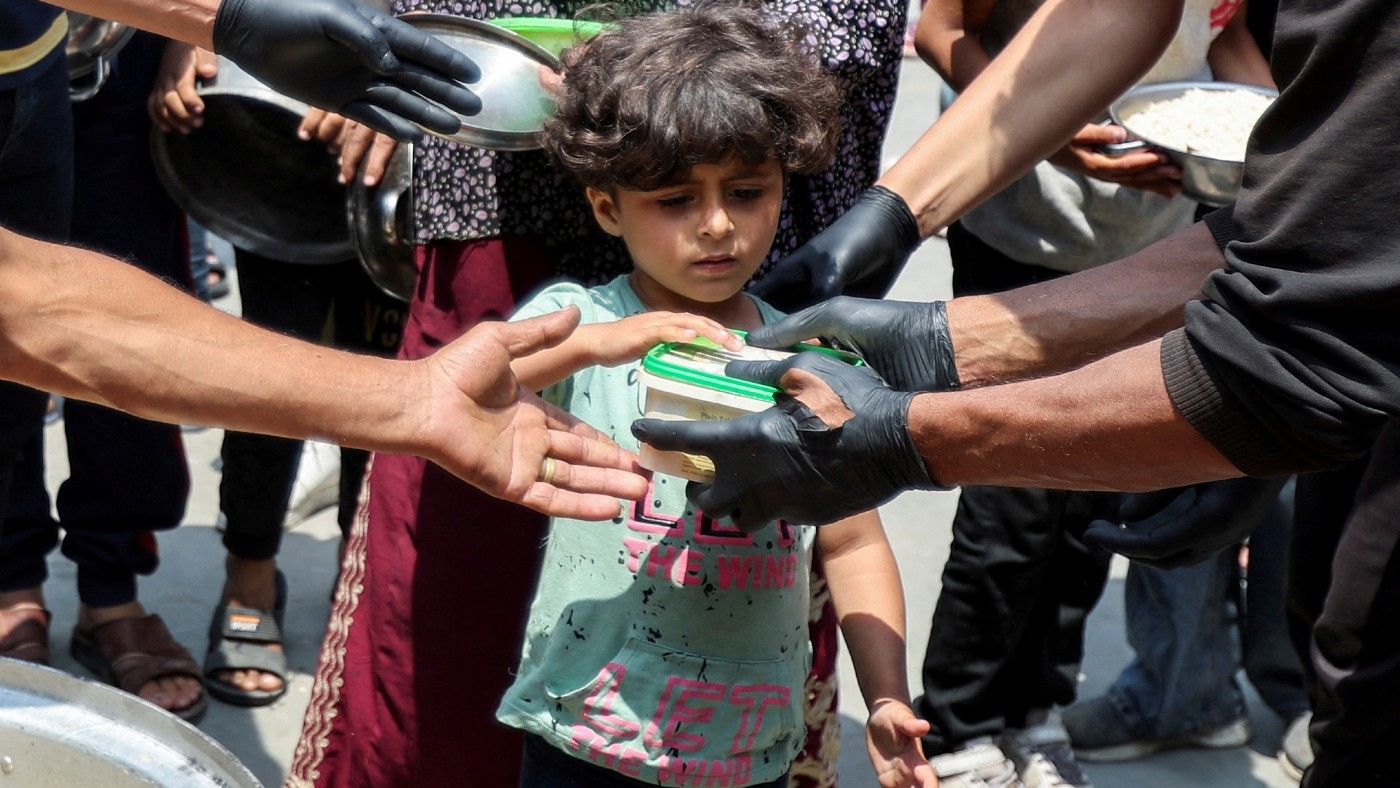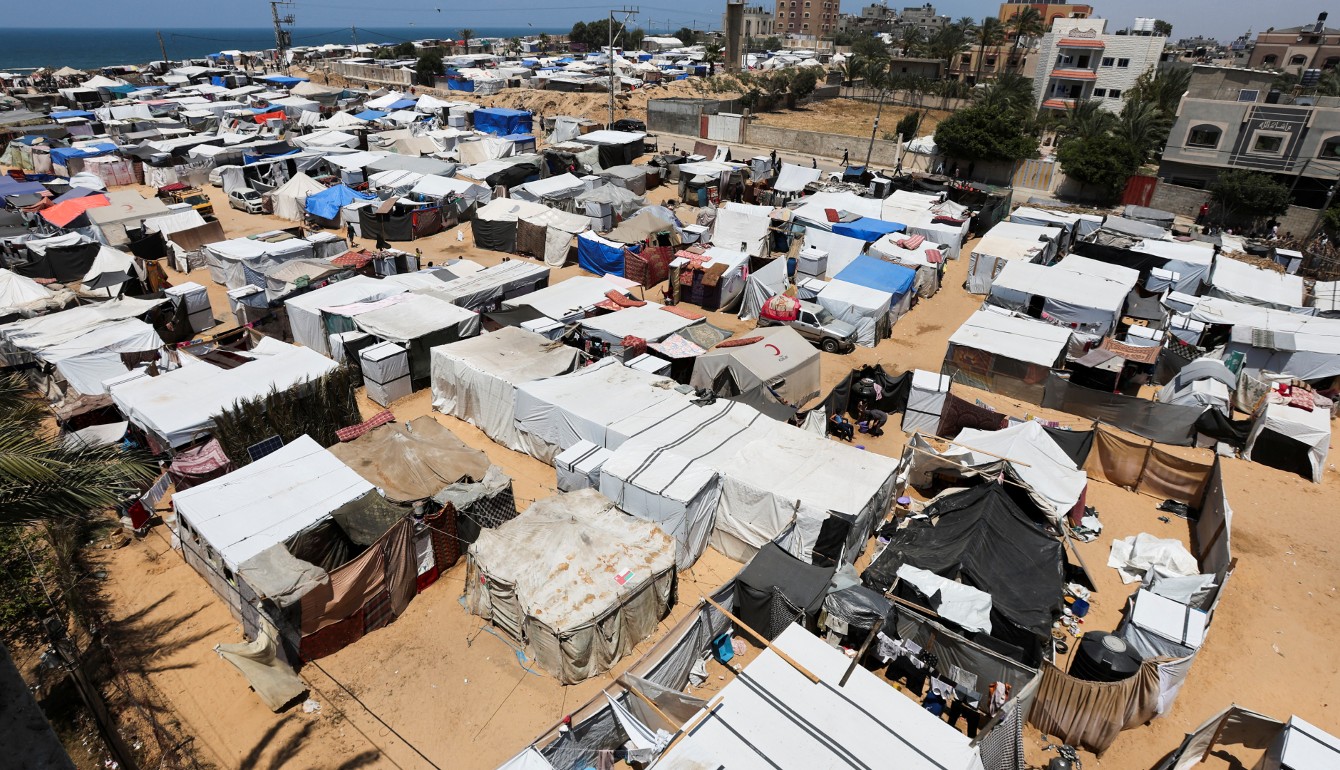War on Gaza: 'Less than a week' of food left in south after Israel seized Rafah crossing
Just six trucks of aid have entered Gaza in the last week, and Palestinians displaced from Rafah face starvation

Displaced Palestinians in central and southern Gaza have less than a week's worth of food left, after Israel seized the Rafah border crossing last week.
On 6 May, the Israeli military took "operational control" of the Palestinian side of the crossing between southern Gaza and Egypt, essentially cutting off aid into the coastal enclave.
Since then, just six trucks of food have entered Gaza through the Karem Abu Salem (Kerem Shalom) crossing with Israel, Juliette Touma, spokesperson for the United Nations' Palestinian refugee agency (Unrwa), told Middle East Eye.
The "very minimum" number of trucks needed is 500 per day, carrying a "combination of fuel, aid supplies and commercial supplies", Touma said. Within the same time frame, 157,000 litres of fuel has come into Gaza. Touma said that 300,000 litres was needed every day.
With so little coming in, food supplies are dwindling and prices soaring. As a "full-blown famine" devastates northern Gaza, sources in central and southern Gaza described a "miserable" situation that could turn into a "real crisis" in a matter of days.
Palestinians, many of whom have been displaced by Israel's war on Gaza more than once, have been forced to leave Rafah, which is subject to an Israeli invasion and ongoing bombardment. According to Unrwa, nearly 450,000 people have fled the southern Gaza city since Israel launched its assault there last week.
But they do not have anywhere safe or suitable to go. Many are heading a few kilometres north to the town of Khan Younis or further on to Deir al-Balah. Both cites are still being bombarded by Israel, and Deir al-Balah has been turned into a city of tents, unable to cope with the huge influx of refugees.
"We could be seeing a new famine in the displacement areas. Displaced people are very worried about the lack of supplies. A major crisis, too, is related to the lack of water fit for drinking," Mohammed al-Hajjar, a Palestinian journalist in Deir al-Balah, said. There are no water sources and bottled water is no longer entering Gaza.
Goods have disappeared from the markets. Potatoes and other vegetables have not been available for a week.
"A few vegetables, such as tomatoes, onions, cucumbers and garlic, and a few legumes, such as lentils, beans and fava beans are all that's left," Eman Mhmd, a maths teacher in Deir al-Balah, told Middle East Eye. "There's no chicken, no eggs, no tissues - many other things have gone."
"The sudden presence of thousands of displaced people has created a state of chaos in the markets of Deir al-Balah," Hajjar added.
"The price of bread tripled within two days. The price of flour has nearly tripled, and it could reach a fivefold increase today. There is a big liquidity and cash crisis in several areas of Gaza that has been ongoing over the past few months. People cannot buy things with such high prices."
Ahmed Abu Aziz, a Palestinian journalist in Khan Younis, said that one kilogram of sugar, which used to cost 12-13 shekels ($3.20), is now priced at 95 shekels ($25.50). He said that food and fresh water had become "very rare and very expensive" in most areas of Khan Younis.
'If this continues for another week I don't think we will be able to provide any more food because the demand is so high'
- Rafeek Elmadhoun, Rebuilding Alliance
The al-Yassin Water Station, in al-Sultan in western Rafah, "used to distribute water to hundreds of thousands of people for free", Abu Aziz said, but because it is now being targeted by Israel, the water is no longer available.
No equivalent facility exists outside of Rafah and Deir al-Balah and other central and southern areas "do not have fresh water, they have salted water which has not been filtered properly. This could lead to a health crisis that ravages the citizens in Khan Younis and the central areas."
Mhmd said that civilians who "used to live on cans of beans they got through Unrwa can no longer find them. People are resorting to extending their hands to ask for help from others to obtain their daily food".
"The food available now is what was previously brought in as aid from the Rafah crossing. But if the crossing continues to be closed, there won't be anything to eat," she added.
"The markets are still operating, with few resources and high prices, but I don't know how much longer they will survive under this stifling siege, the closure of all crossings and the prevention of aid.”
Displaced Palestinians are selling food they previously received as aid in order to buy other essential goods.
"People can't buy anything. If they had some money saved, those savings are gone now," Mhmd said.
Cooking stations
Rafeek Elmadhoun is in Deir al-Balah working with Rebuilding Alliance, a non-profit organisation that has been distributing hot meals in Gaza.
The group has 16 field kitchens in total: 10 in Rafah and Khan Younis and six in central Gaza. They intend to establish five more very soon, Elmadhoun said.
He described the situation in southern and central Gaza as "miserable" and told MEE that it was "impossible" right now to get food in from outside the coastal enclave because of the restrictions in place at the border.
'The crowding is terrifying, unbearable. There is no clean air, no clean water, no healthy food'
- Eman Mhmd, maths teacher in Deir al-Balah
"We, with the support of the World Food Programme [WFP], have some food remaining. We are cooking hot meals to feed displaced people in various areas," he said.
Elmadhoun and his colleagues are trying to do the best with what they have left.
"We are trying to be very economical with the stock we still have. It is unclear when this siege will end and when aid will get into Gaza," Elmadhoun said.
"If this continues for another week I don't think we will be able to provide any more food because the demand is so high and the number of displaced people coming to central Gaza is so many," he said.
The Rebuilding Alliance field kitchens get their vegetables from local markets, but the prices are now too high.
Some farming is still happening in Gaza but, as Elmadhoun said, the yield is vastly reduced because of restrictions on getting seeds and fertilisers into Gaza, and because most of the coastal enclave's agricultural land has been destroyed.
Agriculture accounted for nearly half of Gaza's total land area before the war, according to Unosat, the United Nations' satellite centre. Forty-five percent of that land has now been damaged.
Food going bad
On Friday, Matthew Hollingworth, the WFP's Palestine country director, said that the organisation's main warehouse was "now inaccessible".
"No aid has entered from southern crossings in two days," he wrote. "Only one bakery is still working. Supplies of food and fuel in Gaza will only last one-three days. Without them, our operations will go into standstill."
On Sunday, the Sinai for Human Rights group reported that the closure of the border crossings had led to "large quantities of food" going bad.
"Many trucks loaded with food are damaged and thrown away due to the long waiting period at border crossings," the group said, citing a video taken by an Egyptian truck driver, which it had verified.
Meanwhile, Israelis have been filmed destroying aid at the crossings in recent days, while the Israeli navy has been seen firing on fishing boats off the Gaza coast.
"Gaza needs the regular flow of daily food aid," Touma of Unrwa said. "All those closing the crossings going into Gaza have to reopen them without delay."
Once a very quiet place, Deir al-Balah is "now a city of tents", Mhmd said.
"Tents are everywhere, between houses, on public roads, between side streets, in agricultural lands and empty private land. Everywhere there is a tent. Wastewater fills the streets between the tents... Mosquitoes and insects spread in tents and homes. The crowding is terrifying, unbearable. There is no clean air, no clean water, no healthy food."
In this landscape, displaced Palestinians wait, while the borders stay shut.
https://www.middleeasteye.net/news/war-gaza-food-week-left-israel-seized-rafah-crossing


0 Comments:
Post a Comment
Subscribe to Post Comments [Atom]
<< Home